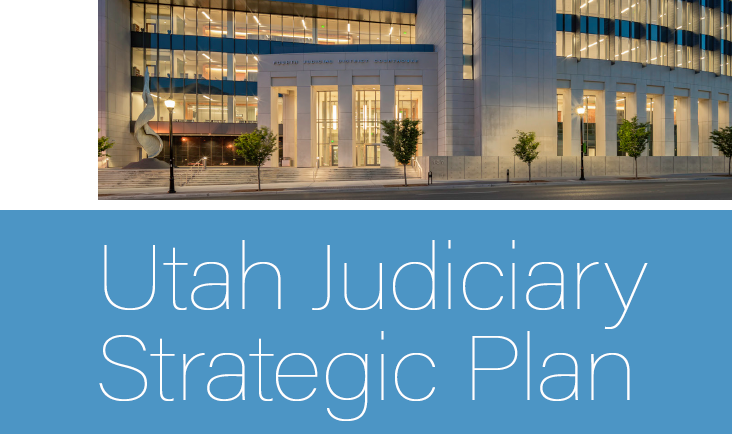When the Judicial Council created the Office of Fairness and Accountability (OFA), it tasked the office with developing a comprehensive strategic plan that would outline the Judiciary’s goals and policy directives. This plan was to support the court’s mission to deliver open, fair, and efficient justice under the law while also being responsive to the state’s diverse cultural, ethnic, socioeconomic, linguistic, physical, gender, and age populations. The Council emphasized that this effort must not only articulate aspirations but must result in concrete strategies to eliminate bias, serve the increasing number of self-represented litigants, and ensure that court processes remain understandable, consistent, and culturally responsive.
Over the course of nearly two years, the Strategic Plan Drafting Committee has worked diligently to fulfill that charge. The result of that work is the Utah Judiciary Strategic Plan 2026–2029, which the Judicial Council recently approved. Representatives from OFA presented the plan to the Utah State Board of Bar Commissioners on June 13, 2025, and was met with undivided support.
This plan is not abstract or theoretical. The Utah State Bar believes it is a practical blueprint for a court system that is better prepared to meet the needs of the public, the legal community, and the rule of law in the years ahead. For attorneys across Utah, this plan offers more than institutional reform. It represents a direct investment in integrity, efficiency, and consistency of your daily practice.
Better Access, Better Practice
The core focus of the strategic plan is enhancing access to justice, particularly through the removal of unnecessary procedural obstacles and the expansion of culturally competent services. The court system’s increasing use of technology has streamlined procedures and reaffirms its commitment to user-focused service delivery, which stands to benefit attorneys as much as litigants.
Attorneys often represent clients who are already facing challenging circumstances. When court systems are unnecessarily complex or inconsistent, that burden is multiplied. The new plan calls for more explicit rules, improved communication, and more supportive courtroom experience for all participants — including legal professionals. Enhanced digital tools, better guidance for self-represented litigants, and training for court staff in culturally responsive service will ultimately reduce delays, misunderstandings, and procedural missteps.
This plan is designed to eliminate friction from legal practice. When systems function smoothly and predictably, attorneys can focus more fully on substantive advocacy and client service.
A System Worth Representing
The legal profession does not exist in a vacuum. Public trust in the Judiciary has a direct impact on public confidence in lawyers. When courts are seen as transparent, impartial, and consistent, that perception extends to the attorneys who practice before them.
This plan reaffirms the Judiciary’s commitment to being open, fair, and inclusive. It builds on Utah’s long-standing reputation for judicial excellence by expanding community engagement, reinforcing ethical practices, and increasing accountability across all levels of the court. These efforts not only serve the public, but they support the professional standing of the legal community.
As the plan notes, “the public sees the courts through us.” When attorneys operate in a system that earns respect, credibility reflects on the profession as a whole.
You Asked, We’re Acting
OFA developed many of the initiatives outlined in the 2026–2029 Strategic Plan in direct response to concerns raised by members of the legal community. Attorneys have consistently expressed frustration with inefficiencies, inconsistent procedures between districts, and barriers to access for their clients. This plan addresses those concerns head-on.
The plan commits to standardizing processes across court locations, investing in improved training and tools for judicial officers and staff, and expanding mechanisms for community and attorney feedback. These are not abstract goals; they are actionable priorities that recognize the realities attorneys face and aim to address them in measurable, sustainable ways.
Attorneys will see a judiciary that is better aligned across districts, more open to input, and increasingly focused on delivering quality service. These improvements will not only enhance client outcomes but also create a more navigable and responsive system for practitioners.
Looking Ahead
The Utah Judiciary’s 2026–2029 Strategic Plan reflects more than policy; it represents a shared commitment to building a legal system that serves everyone with integrity, clarity, and fairness. As members of the legal profession, attorneys play a central role in the success of this effort. Your engagement with the plan, through your feedback, expectations, and daily work, will help bring its vision to life.
The system is not being reinvented, but it is being prepared for the future. The Judiciary is reaffirming its core values: openness, fairness, inclusivity, independence, and efficiency. Attorneys are not bystanders in this work. You are essential to it, and why the Bar supports the plan.
To read the whole strategic plan and learn more about its implementation, visit www.utcourts.gov.
 Borden and Carrington spotlight several widely used platforms, such as ChatGPT, Microsoft Copilot, Zoom AI Companion, Notebook LM, Notion AI, and others. They talk about each platform offering targeted capabilities that can streamline research, expedite drafting, support matter organization, or clarify complex concepts for clients and colleagues. Whether used to summarize lengthy documents, generate issue-spotting outlines, or organize case-related materials, these systems can help lawyers reclaim valuable time for higher-order analysis and client engagement.
Borden and Carrington spotlight several widely used platforms, such as ChatGPT, Microsoft Copilot, Zoom AI Companion, Notebook LM, Notion AI, and others. They talk about each platform offering targeted capabilities that can streamline research, expedite drafting, support matter organization, or clarify complex concepts for clients and colleagues. Whether used to summarize lengthy documents, generate issue-spotting outlines, or organize case-related materials, these systems can help lawyers reclaim valuable time for higher-order analysis and client engagement.


